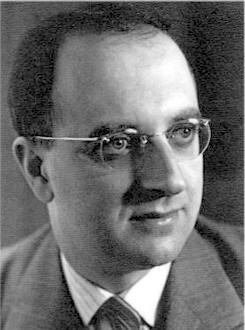Musical Director of the Society from 1946 until 1987

Walter Bergmann
Source:Musican for a While, by Anne Martin
published with permission of Peacock Press
(from the obituary in The Recorder and Music Magazine March 1988 by Edgar Hunt with some additional information)
A son of an official of the German railways, Walter Bergmann studied law in the Universities of Halle, Leipzig and Freiburg im Breisgau, and became Doctor of Law (utriusque juris). But the family was musical, his father had a good voice and Walter studied the flute at the Conservatory in Leipzig. There his teacher was Maximilian Schwedler and, as Walter was also a capable amateur pianist, Schwedler made full use of him to accompany many of his other pupils. He held the position of Rechtsanwalt (barrister) at Halle until 1938. But the authorities did not approve of his defence in many race cases, and he escaped to England in 1939 with a suitcase of books, music and his flute, followed soon after by his wife Greta.
In England his legal qualifications were of no value (utriusque juris signifies Roman and German law), so he decided to make music his profession and specialize as a continuo player. But there was a war on, and he was classed as an enemy alien and interned in the Isle of Man. In due course he was released from internment to take over the writer’s job at Schott the music publishers. He also worked for a time in a factory where he studied the British sense of humour and the cockney vernacular. Eventually he became a naturalized British citizen.
Probably Walter Bergmann’s greatest contribution to British music started with his collaboration with Michael Tippett at Morley College. He started a recorder class there and was involved with the choir. That led to the music of Purcell and the revival of the countertenor voice in the person of Alfred Deller. With Tippett he edited a number of Purcell’s songs for publication by Schott and he accompanied Deller on some ’78’ records and on many public occasions. Through the recorder class he kept interest in that instrument alive during the war among amateurs, so that when the Society of Recorder Players was reformed in 1946 there was a nucleus of players on which to build. He became one of the Society’s musical directors and one of the founders of the Recorder in Education Summer Schools. His own compositions include two sonatas for recorder and piano.
Through his position at Schott’s he was able to keep recorder players supplied with new editions to study and play, editing much of it himself, but also encouraging many others. His editions of Barsanti, Telemann, Dieupart, Purcell, Blow and Schickhard show the range of his practical scholarship. His responsibilities also covered the Eulenburg editions of miniature scores. After his retirement from Schott some of his editions were published by Faber and he started a summer school for baroque music.
Walter Bergman was also interested in musical education and helped many young artists with his advice and by making opportunities for them to perform. He early recognized the exceptional musicianship of Frans Brüggen and arranged for him to give master classes in London so that young players should benefit.
To the amateur recorder player Walter Bergmann is also well known for his witty aphorisms (‘The 26 Golden Rules for Ensemble Playing’) still heard occasionally. They can be read at http://www.manucornet.net/blog/twenty-six-golden-rules-of-ensemble-playing/.
In 2016 Ross Winters gave an interview, focusing on his memories of Walter Bergmann, at the Royal College of Music as part of a research project on émigré musicians (Singing a Song in a Foreign Land).
Further information on the life of Walter Bergmann can be found in ‘Musician for a while: a biography of Walter Bergmann’ by Anne Martin, Peacock Press, 2002.

